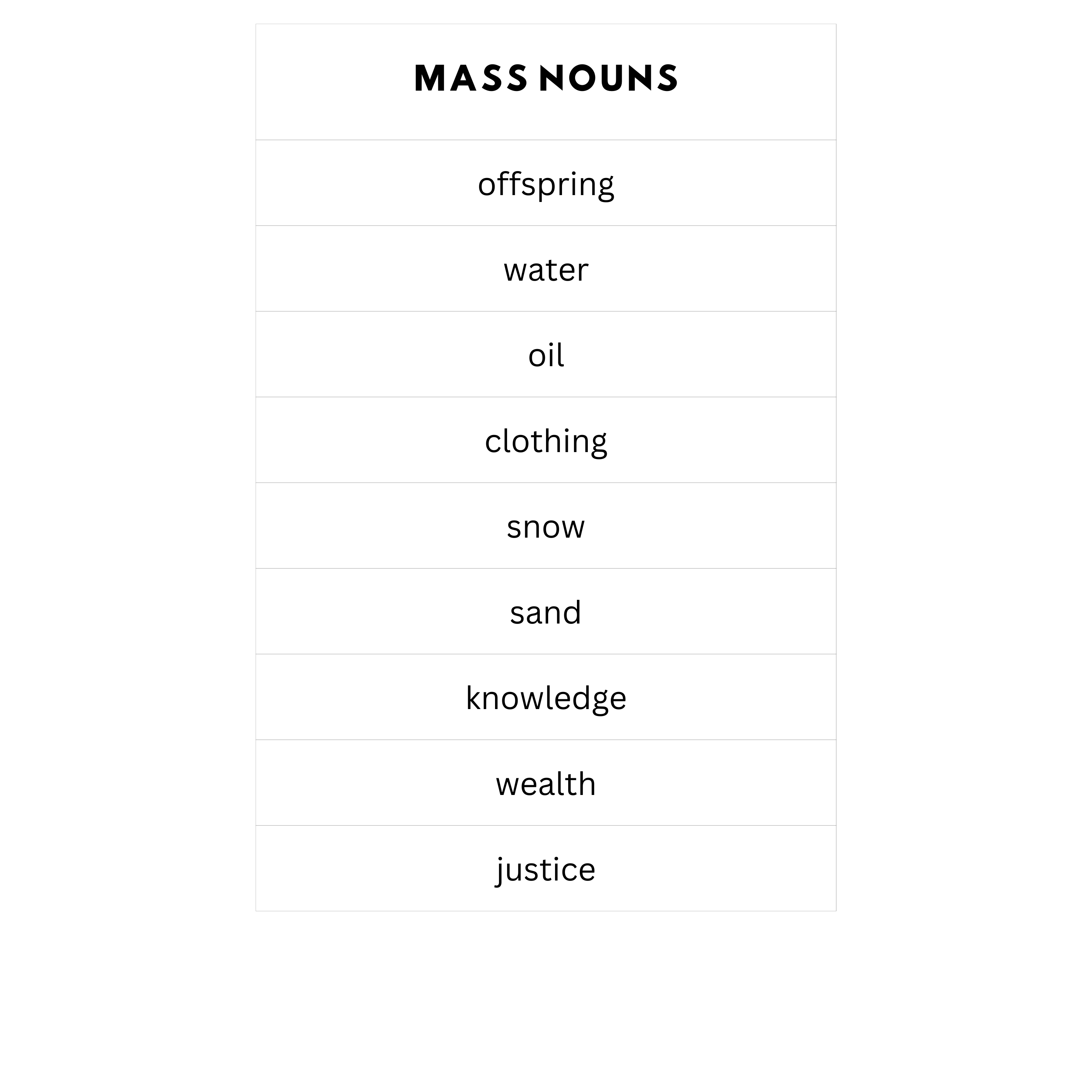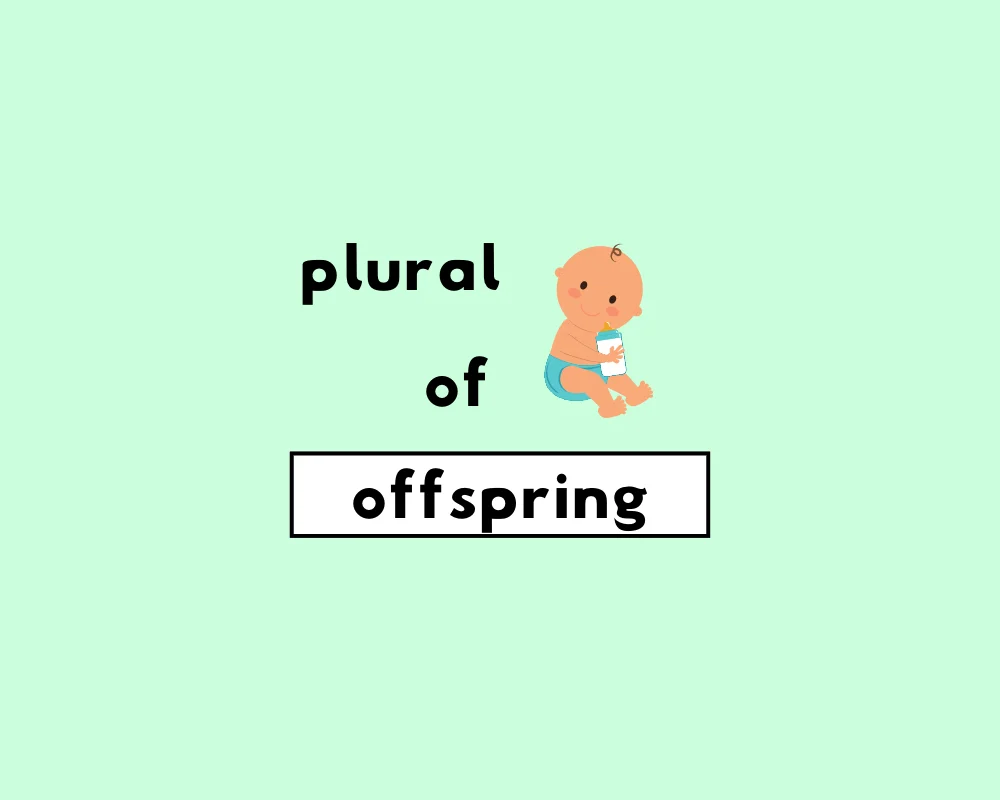What’s the plural of “offspring”?
Offspring only has a singular form, and is considered a mass noun or non-count noun (similar to fire, knowledge and water.) Non-count nouns, or mass nouns, do only have a singular noun forms, though they’re technically not easily quantifiable or … countable.
The offspring thrived in their new environment.
We observed the offspring‘s behavior carefully.
The offsprings were playful and energetic.
Many offsprings were born this year.
What’s the singular of offspring?
Offspring is a singular noun form, though it refers to multiple of something. Offspring is what’s called a mass noun in English, which are nouns that are non-countable, or exist as masses or substances that cannot be quantified. Mass nouns also may be abstract or conceptual, such as knowledge or wisdom (these are also abstract nouns).
What does the word offspring mean?
Offspring is defined in the dictionary as, the “product of the reproductive processes of a person, animal, or plant : young, progeny.”
Remember that “offspring” is a mass noun, like “water” or “furniture.” Mass nouns are uncountable and don’t take a plural form. If you need to refer to multiple offspring, use phrases like “several offspring” or “many offspring,” not “offsprings.”
Other mass nouns

Examples of the word offspring used in sentences
The following sentences show the correct use of the word offspring in context:
1. Human offspring are referred to as children.
2. Cloning is the production of an offspring which represents the identical genes as its parent.
3. The substitution of the typewriter and its offspring for the author’s own hand. Jacques Barzun
4. The disease can be transmitted from parent to offspring.
5. You can hear this Caribbean club music, a hard-edged and party-heavy offspring of reggae … Lorraine Ali
Origin of the word offspring
From etymology online on offspring (n.):
Old English ofspring “children or young collectively, descendants,” literally “those who spring off (someone),” from of “away, away from” (see off (prep.)) + springan “to spring”.
What’s the difference between they’re, their, and there?
Beyond the examples already given, many other words fall under the umbrella of mass nouns. Consider substances like “furniture,” “equipment,” and “luggage.” These represent collections of individual items, but we don’t typically count them. We say “a piece of furniture” or “a piece of equipment,” introducing a countable unit within the uncountable mass. Similarly, we might speak of “items of luggage,” again highlighting the individual components within the larger, uncountable whole.
Another category encompasses abstract concepts. Words like “advice,” “information,” and “knowledge” are mass nouns. We can’t say “two advices” or “three knowledges.” Instead, we quantify them using phrases like “a piece of advice,” “a lot of information,” or “a great deal of knowledge.” The same principle applies to “progress,” “research,” and “evidence.” These represent ongoing processes or accumulations, not discrete entities.
Grammatically, mass nouns generally don’t take a plural form. Attempting to pluralize them often sounds unnatural or incorrect. However, context can sometimes bend this rule. For instance, “waters” might refer to distinct bodies of water, and “beers” might refer to different types of beer. This shift occurs when the mass noun is conceptually divided into distinct categories or varieties, effectively becoming countable in that specific context.
Finally, it’s important to note the difference between mass nouns and collective nouns. While both refer to groups, collective nouns (e.g., “team,” “family,” “flock”) can be treated as either singular or plural depending on whether the emphasis is on the group as a single unit or its individual members. Mass nouns, however, remain fundamentally uncountable, regardless of context. The key distinction lies in the inherent countability of the underlying elements. A team consists of countable individuals; furniture does not. Understanding this distinction clarifies the proper grammatical treatment of these different types of nouns.
Worksheet
What is the plural of “offspring”?
Which of the following is the most grammatically correct sentence?
“Offspring” is considered what type of noun?
If you want to refer to multiple offspring, which is the best way to phrase it?
Which of the following nouns behaves similarly to “offspring” in terms of plurals?
The farmer observed that the ______ were healthy and strong.
Even though the word ______ is singular, it can refer to multiple young.
“Offspring” originated from the Old English phrase meaning “those who ______ off.”
Like “furniture,” the word “offspring” is a ______ noun and therefore doesn’t usually take a plural form.
Instead of saying “offsprings,” it’s more correct to say “a group of ______.”
Frequently Asked Questions
What is the plural of “offspring”?
+
Can I say “offsprings” to mean many?
+
What kind of noun is “offspring”?
+
What does “offspring” actually mean?
+
Is “offspring” singular or plural?
+
Yash, D. "What’s the Plural of Offspring?." Grammarflex, Jun 20, 2025, https://www.grammarflex.com/whats-the-plural-of-offspring/.
Sources
-
Definition of offspring.











